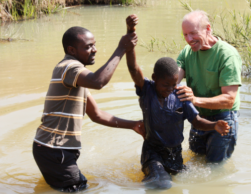Requires a Bachelor’s degree plus a minimum 30 credit hours of additional study.
Materials for each course in this program consist of a series of twelve or sixteen audio/video lectures, a textbook, or a workbook. Students are required to listen to the lectures, to read the textbook and to answer the questions prepared for each course. Answer sheets are provided for that purpose. This process may require the student listen/view the lectures or read the textbook several times. Students are then required to prepare an outline of the contents of each audio/video lesson, or each chapter in the textbook.
The student must also read an additional book(s) related to the subject matter being taught or another assigned book for that course and prepare a five (5) page book report (what the book teaches) on each additional book(s).
NOTE: A student cannot begin studies in a new course unless all requirements for the previous course have been completed and submitted.
Special Note: If a student is changing his or her field of study from what it was in the Bachelor’s degree to a different field for the Master’s degree, he or she will have to take additional courses to ensure competency in the new field of study. If the student has not taken SG 0513 The Purpose Driven Life, and/or SG 5163 The Normal Christian Life, SG 5103 Could You Not Tarry One Hour, or SG 5273 The Bait of Satan, these courses must be taken in addition to any other requirements for a degree.
For more details, click below:
All outlines, essays, and book reports are to be written as per the format provided in the appendix of this catalog For each course in the master degree program, the course test will comprise 50%, the outlines will comprise 10%, the essays will comprise 10%, and the book report(s) will comprise 30% of the course grade. All scores will be averaged together for one grade.
Choose ten (10) courses from the Intercultural Studies section under Course Descriptions.
Minimum 30 Credit Hours
Note 1: If the student has not taken SG 5163 The Normal Christian Life, SG 0513 The Purpose Driven Life, SG 5273 The Bait of Satan, SG 5103 Could You Not Tarry One Hour, SG 5123 Communion with God, and MN 5513 The Seven Mountain Strategy, he or she must take these courses as additional pre-requisite courses.
Note 2: If the student has not taken IS 0713 Intercultural Studies Ministry Practicum, IS 0723 The Missionary Task, IS 0733 Contextualization and the Indigenous Church, IS 0743 Church Planting Movements, IS 0753 Money and Missions, IS 0763 Cults and World Religions, IS 0773 Orality and Storytelling, IS 0783 Revival and Community Transformation, IS 0793 Community Development, and IS 0803 Missions in a Pluralistic, Postmodern World, he or she must take these courses as a part of the thirty (30) hours of Intercultural Studies courses.
Note 3: In order to receive a Master Degree of Ministry in Intercultural Studies, a student must have a minimum of thirty (30) hours in Intercultural Studies.
Covenant Theological Seminary has been declared by the appropriate state authority exempt from the requirements for licensure under provisions of North Carolina General Statutes Section (G.S.) 116-15 (d) for exemption from licensure with respect to religious education. Exemption from licensure is not based upon any assessment of program quality under established licensing standards.
All degrees of Covenant Theological Seminary are of an ecclesiastical nature, and whether granted or conferred, are in the restricted area of religion with the special purpose of preparing persons to work in the area of religion, whether educational or ministerial; they are not designed to be used in general academic circles.
Transferability of credits earned at Covenant Theological Seminary and transferred to another institution is at the discretion of the receiving institution. The degree programs of this seminary are designed solely for religious vocations.
Credits and degrees earned from independent colleges in the State of North Carolina, which are authorized by the State Board of Independent Colleges and Universities, do not qualify the holder for a state teaching certification, nor do they qualify him or her to participate in professional licensing examinations. Any person interested in obtaining a state teaching certificate or practicing a regulated profession should contact the appropriate regulatory agency in the field of his/her interest.
None required.

